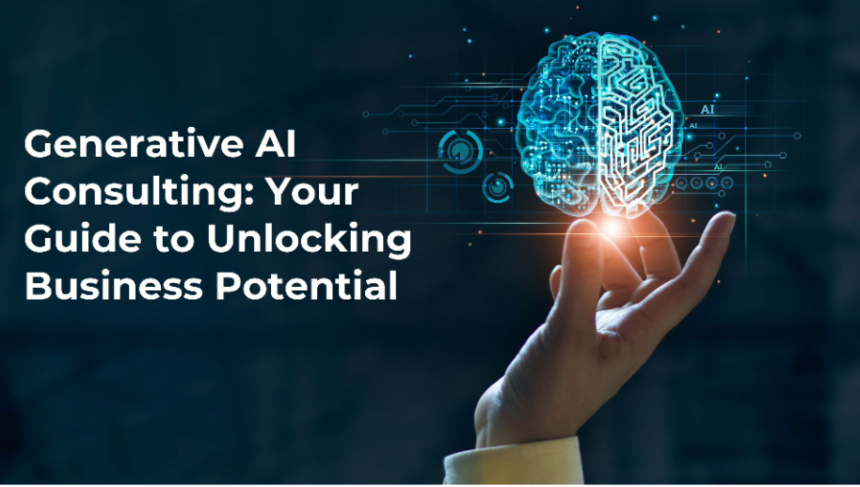Generative AI is a type of artificial intelligence that can completely transform businesses by increasing productivity, boosting customer satisfaction, cutting expenses, and maintaining a company’s competitive edge. Using commercial and open-source AI models, it can help produce text, images, audio, and video, opening up a wide variety of possibilities in many industries.
Generative AI could be your daily AI assistant, helping you with various tasks. It automatically generates social media posts, product descriptions, and email drafts, allowing your company’s employees more time and resources for high-level strategic tasks.
In contrast to conventional AI systems, which depend on explicit data patterns or predetermined rules, generative AI uses sophisticated neural networks to learn from enormous datasets and produce results independently.
By boosting operational efficiency, developing compelling marketing campaigns, identifying fraud, or producing exceptional virtual agents, Generative AI consulting can unleash creativity across various industries and accelerate Innovation.
The economic potential of generative AI is enormous. According to a report by McKinsey, generative AI’s impact on productivity could add trillions of dollars in value to the global economy, potentially delivering $2.6 trillion across 16 business functions. This represents a 15 to 40 percent increase in the economic value that AI could provide, from $11 trillion to $17.7 trillion.
How Can Businesses Benefit from Generative AI Consulting
Generative AI has the potential to impact most business functions. With customer operations, marketing and sales, software engineering, and research and development – accounting for approximately 75 percent of the total annual value from generative AI use. It can help businesses in several ways:
- Personalize Customer Experience
Analyzing large volumes of customer data helps business leaders understand preferences, behaviors, and trends. With this knowledge, companies can generate personalized recommendations, targeted advertisements, and tailored experiences, ultimately fostering better customer engagement and loyalty.
- Streamline Business Operations
Gen AI automates repetitive and time-consuming procedures, improving efficiency and streamlining operations. Additionally, businesses can use generative AI to cut costs and streamline operations through various applications, such as anomaly detection, predictive maintenance, and automated report generation.
- Enhance Decision Making
Generative AI can enhance decision-making by creating alternative scenarios, testing theories, predicting outcomes based on past evidence, and conducting simulations. Furthermore, It can analyze large volumes of data, identify patterns, and generate forecasts or simulations to aid in decision-making processes.
- Risk Assessment and Mitigation
With the help of generative AI, businesses can efficiently detect and mitigate risks. Companies can reduce the chance of expensive disruptions by proactively addressing risks and weaknesses and analyzing intricate data patterns and scenarios.
- Drive Innovation
Brainstorming sessions can sometimes be very frustrating as you need to think of the right strategy or solution. However, AI can generate new ideas and stimulate original thinking. Analyzing large datasets and identifying patterns can be helpful in developing innovative concepts for new products, implementing powerful marketing campaigns, or finding fresh perspectives on existing problems.
Common Use Cases of Generative AI
- Marketing & Advertising: Depending on your audience’s demographics, Generative AI can create engaging social media posts, product descriptions, email marketing material, and even tailored advertisement copy.
- Media & Entertainment: Gen AI capabilities extend to creating realistic dialogue for chatbots, short-form video scripts, or even genre-specific music compositions.
- Design & Arts: It can produce distinct artistic styles for illustrations, make mockups for product packaging, or even develop variants of design concepts.
- Financial Services: Generative AI can create customized investment reports, forecast financial risks, and uncover market trends by analyzing large datasets.
- Healthcare: Gen AI analyzes medical data to create accurate medical simulations, identify possible medication targets, and customize treatment regimens. For example, HCS High Content Screening can be used to analyze cellular responses to various compounds, generating valuable data. Gen AI can then analyze this data to identify patterns and relationships, providing further insights into potential drug efficacy for individual patients.
- Scientific Research: In scientific research and development, generative AI speeds scientific discovery and develops new research questions and hypotheses based on available data sets.
- Software Development: This powerful AI can create test scripts, automate tedious coding activities, and even provide code suggestions based on preexisting codebases.
- Customer service: Generative AI can be used to design chatbots that respond to client inquiries in natural language, cutting down on wait times and raising client happiness.
- Product Development: It helps quicken the innovation cycle by coming up with fresh product concepts based on consumer and market trends.
- Education: Gen AI can enhance the learning and teaching experiences of educators and students by providing individualized learning materials and flexible learning environments that meet the needs of each unique learner.
- In contrast to conventional AI systems like AI chatbots in contact centers, which depend on explicit data patterns or predetermined rules, generative AI uses sophisticated neural networks to learn from enormous datasets and produce results independently.
Popular Generative AI Models to Look Out for in 2024
Generative AI models are constantly evolving. Below are some of the most popular and well-known models:
- GPT -3 & GPT -4: These robust language models are developed by OpenAI. They can generate various creative text types, such as code, poems, scripts, musical pieces, letters, emails, and more. Besides, they are quite good at comprehending and reacting to intricate instructions.
- Meena: Google developed this specialized Gen AI model. It can produce human-like speech and is renowned for having interesting and meaningful conversations.
- OpenAI’s DALL-E 2: Based on text descriptions, this model creates remarkably imaginative and realistic visuals. It allows for fine-tuning details and variations within the generated image.
- Midjourney: In the text-to-image space, Midjourney is known for its capacity to produce creative and artistic images in response to user inputs.
- Stable Diffusion XL Base 1.0 (SDXL): This open-source model is best suited for generating high-quality and diverse images, ranging from portraits to photorealistic scenes. It’s particularly well-known for its user-friendly interface and customization options.
- PanGu-Coder2: This AI model, developed by BAAI in China, pushes the limits of AI-powered coding. Its functionalities include code review, debugging support, and code optimization recommendations, in addition to understanding and producing code in various programming languages.
Common Challenges of Generative AI Consulting
Even though generative AI offers exciting possibilities, implementing it effectively requires careful consideration. Let’s take a look at some common challenges businesses might face when venturing into Generative AI consulting:
- Data Quality: High-quality data is very much essential for generative AI to function well. Inadequate, biased, or poorly labeled data may lead to accurate or correct results. Consulting businesses must follow proper data collecting, cleansing, and pre-processing procedures.
- Data Security and Privacy: Data ownership and privacy ethics become crucial for data security and privacy. To safeguard confidential data, consulting firms must take strong security precautions and be open about how they use data.
- Choosing the Right Model: When selecting a Generative AI model – text-to-text, text-to-image, code generation, etc. —consultants must consider the business’s unique requirements.
- Training and Optimization: Effectively training Generative AI models requires expertise. Consultants must optimize the training process to guarantee that the model produces impartial, accurate, and relevant outputs.
- Integration with Existing Systems: Integrating generative AI with current business processes can be difficult. Consultants must thoroughly understand the current infrastructure to create strategies for seamless integration.
- User Adoption: Implementing Generative AI has the potential to disturb current processes. Consultants must respond to staff grievances, offer thorough training, and promote a culture that embraces new technologies.
Conclusion
Generative AI consulting is your compass in artificial intelligence’s exciting yet complex world. By streamlining workflows, sparking Innovation, and offering data-driven insights, Generative AI unlocks a treasure trove of business potential. Embrace this transformative technology with the guidance of a qualified consultant, and propel your business towards a future brimming with intelligent efficiency and boundless creativity.


